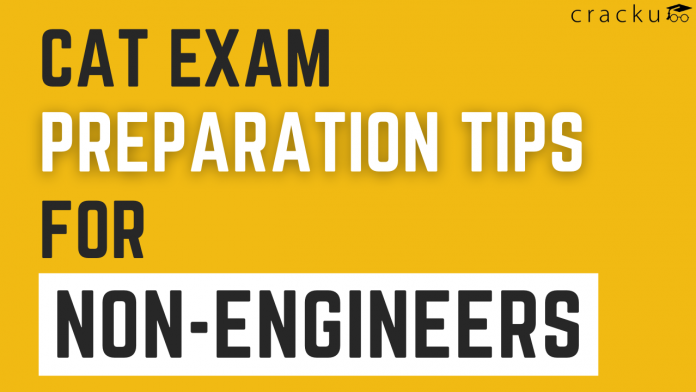The Common Admission Test (CAT) is a highly competitive exam in India that is taken by thousands of students every year for admission to top-tier management institutes like the Indian Institutes of Management (IIMs) and other prestigious B-schools. While many CAT aspirants come from an engineering background, it is not a prerequisite to crack the exam. In this blog, we will discuss some tips for non-engineers to crack the CAT exam.
CAT 2023 Preparation Strategy For Non-engineering Students
Understand the Exam Pattern and Syllabus
The first step to cracking the CAT exam is to understand the exam pattern and syllabus thoroughly. The CAT exam consists of three sections – Verbal Ability and Reading Comprehension (VARC), Data Interpretation and Logical Reasoning (DILR), and Quantitative Ability (QA).
| SECTION | DURATION | Number of questions (Expected) |
| Verbal Ability and Reading Comprehension | 40 minutes | 24 |
| Data Interpretation and Logical Reasoning | 40 minutes | 20 |
| Quantitative Ability | 40 minutes | 22 |
| Total | 120 minutes | 66 |
Each correct answer is awarded 3 marks, and each wrong answer carries a penalty of -1 mark. Each section has a sectional time limit of 40 minutes, and candidates are not allowed to switch between the sections.
The syllabus of the CAT exam includes topics like Reading Comprehension, Vocabulary, Grammar, Critical Reasoning, Data Interpretation, Logical Reasoning, Arithmetic, Algebra, Geometry, and Modern Mathematics. Knowing the exam pattern and syllabus will help you prepare a strategic study plan and allocate your time and resources accordingly.
Focus on Your Strengths
Non-engineers may have a different set of strengths and weaknesses than engineers. It is essential to identify your strengths and focus on them. For example, if you are good at reading and analyzing texts, you can focus more on the VARC section. Similarly, if you have a good grasp of mathematical concepts, you can focus on the QA section. It is advisable to practice questions related to your strengths regularly.
Work on Your Weaknesses
While focusing on your strengths, it is also essential to identify your weaknesses and work on them. For example, if you find it challenging to comprehend Reading Comprehension passages, you can work on improving your reading speed and practice more RC passages. Similarly, if you struggle with Data Interpretation, you can practice more DI questions and study the concepts of Data Interpretation in detail.
Practice Mock Tests
Mock tests are an essential part of CAT preparation. It is crucial to practice as many mock tests as possible to get a feel for the actual exam. Mock tests help you understand your strengths and weaknesses and identify the areas that require more attention. It is advisable to take the mock tests at the same time as the actual exam to get a real-time experience.
Time Management
Time management is critical in the CAT exam. You have to answer 120 questions in 120 minutes, which means you have to solve one question per minute. It is advisable to allocate a fixed time for each section and try to stick to it. For example, you can allocate 40 minutes for VARC, 40 minutes for DILR, and 40 minutes for QA. Time management will help you attempt all the questions and maximize your score.
Take Help from Online CAT Courses
If you feel you need extra help and guidance, you can take CAT online course. Taking online course can help you identify your strengths and weaknesses and prepare a study plan accordingly. They can also provide you with mock tests, study material, and expert guidance.
Is CAT Exam Easy For Non-Engineers?
- The level of difficulty of the CAT exam is subjective and varies from person to person. While non-engineers may find some sections of the exam more challenging than others, it is not accurate to say that the CAT exam is easy or difficult for non-engineers.
- Non-engineers may have a different skillset than engineers, but with the right preparation and dedication, they can excel in the exam. The CAT exam is designed to test the candidates’ overall aptitude and analytical skills, including their reading comprehension, problem-solving, and logical reasoning abilities.
- It is essential to understand that cracking the CAT exam requires a lot of hard work, dedication, and strategic planning, regardless of the educational background. Non-engineers should focus on their strengths, work on their weaknesses, practice regularly, and take help from coaching institutes if required.
- CAT exam is easy or difficult for non-engineers depends on their individual strengths, weaknesses, and preparation strategy. With the right approach, non-engineers can perform exceptionally well in the exam and secure admission to top-tier management institutes.
Is There Any Advantage For Non-engineers After Taking CAT?
- High chances to get shortlisted for IIMs: To attract more non engineers, IIMs have changed their admission policy. Weightage in the range of 5 to 10 percent is awarded in the shortlisting and final selection process by top IIMs to non engineer who scored will in the CAT to improve academic diversity in their class rooms.
- Career Diversity: Non-engineers can have an advantage in exploring diverse career opportunities after completing their management education. They can leverage their prior education and experience to specialize in areas such as marketing, finance, human resources, operations, or analytics.
- Better Communication Skills: Non-engineers often have a strong command of the English language and may be better at communicating their ideas and thoughts effectively. This can be advantageous in several job roles, including client-facing roles, sales, marketing, and consulting.
- Problem-Solving Skills: Non-engineers can have an advantage in problem-solving, as they may have a different way of analyzing and interpreting data. This can be helpful in several job roles that require analytical skills, such as data analytics, market research, and consulting.
- Interdisciplinary Approach: Non-engineers can bring an interdisciplinary approach to problem-solving and decision-making, which can be advantageous in several industries. This approach can help them understand different perspectives and find innovative solutions.
Join our Telegram group of MBA aspirants for quick and regular exam updates.




![CAT Averages Questions PDF [Important Questions] CAT AVERAGES Questions PDF](https://cracku.in/blog/wp-content/uploads/2022/07/CAT-AVERAGES-Questions-PDF-218x150.png)
